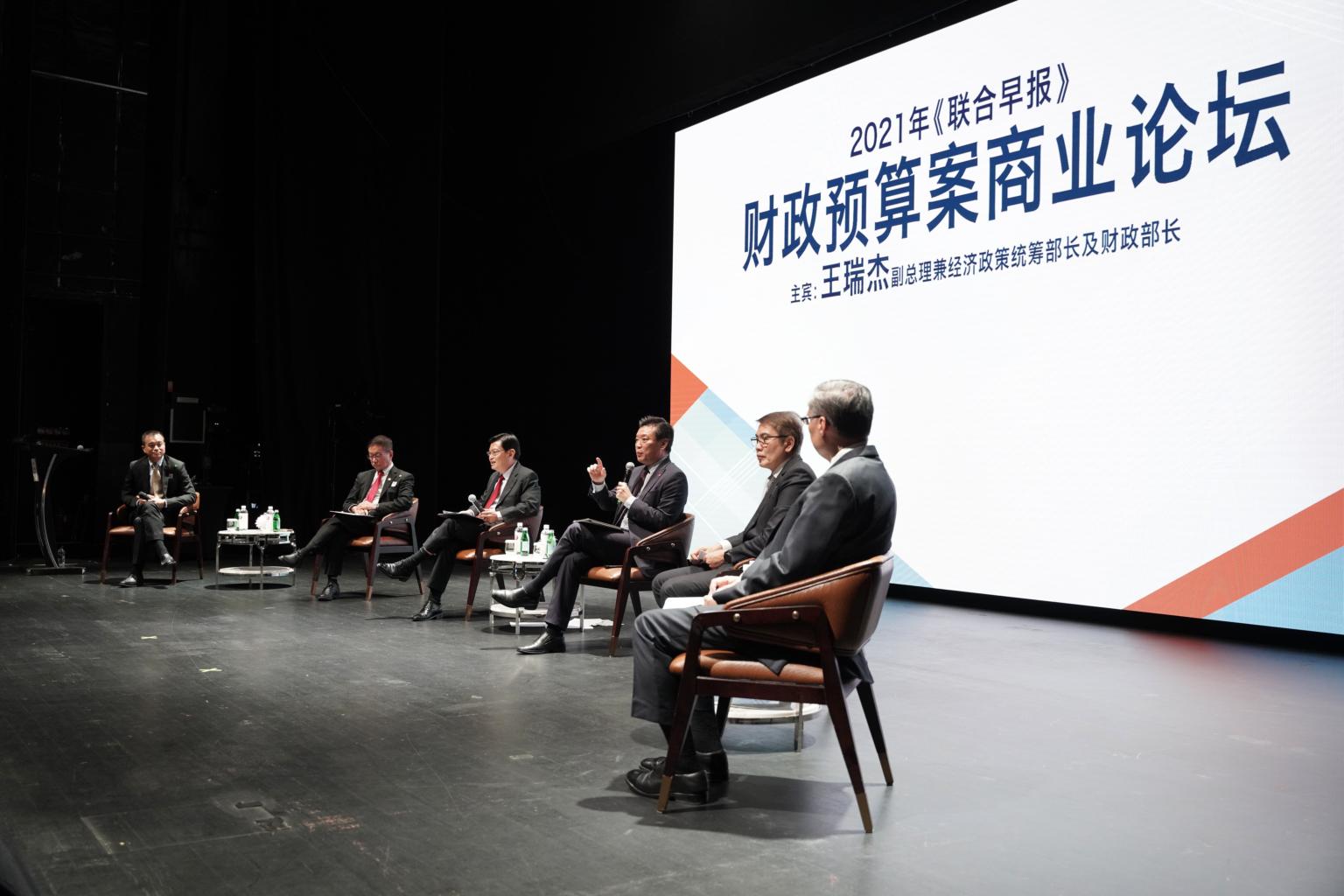Go green to stay competitive: Heng Swee Keat to local businesses
Sign up now: Get ST's newsletters delivered to your inbox

Deputy Prime Minister Heng Swee Keat (third from left) with other panellists at the Lianhe Zaobao Singapore Budget 2021 Business Forum.
PHOTO: LIANHE ZAOBAO
SINGAPORE - Going green will help Singapore's businesses stay competitive, said Deputy Prime Minister Heng Swee Keat on Monday (March 15), urging local firms to take advantage of government schemes to help them make the leap.
He recounted a conversation with a German businessman in the finance industry, who told him that in Europe, it was important for every company to have some indication of its green commitments on its website.
"If your website doesn't have it, many consumers will not want to buy your things," the businessman had told him.
Mr Heng, who is also Finance Minister, noted that Singapore has grants such as the Energy Efficiency Fund, which helps firms make their industrial premises more energy efficient, as well as the new Enterprise Sustainability Programme targeted at small and medium-sized firms.
The programme, first announced last month as part of the Singapore Green Plan 2030, is meant to help firms use resources more efficiently and develop new green products and solutions.
"I know it's not easy," Mr Heng said. "But it's only when we manage to successfully do something difficult that we can truly count ourselves as being competitive."
The minister was one of five panellists at the Lianhe Zaobao Singapore Budget 2021 Business Forum. The others were: Singapore Chinese Chamber of Commerce and Industry president Roland Ng, Singapore Business Federation chairman Lim Ming Yan, Association of Small and Medium Enterprises president Kurt Wee and UOB global economics and markets research executive director Suan Teck Kin.
The discussion was conducted in Mandarin and moderated by Lianhe Zaobao editor Goh Sin Teck.
During the session, Mr Wee asked why the Government's decision to impose the goods and services tax (GST) on imported low-value goods kicks in only two years from now, given that the intention is to give local businesses a level playing field. The move to charge GST on goods worth $400 or less starts from January 2023.
"I would like to do it more quickly as well, but we need to give businesses time to prepare," Mr Heng replied, noting that certain IT processes will take around two years to change.
The topic of the work-from-home revolution also came up, with panellists elaborating on the pros and cons. For instance, companies can be more agile and even consider putting significant portions of their business in a different country, Mr Lim said. "But the thing to consider is how this will impact corporate identity and employee cohesion."
Mr Ng and Mr Suan both underlined the continued importance of face-to-face interaction, with Mr Heng adding that building relationships virtually - especially at regional Asean meetings or international events such as the Group of 20 summit - can be challenging.

Even so, remote working has proved possible for Singapore, Mr Heng said, noting that a significant proportion of his ministry's staff are still working from home.
"I don't feel that our productivity has dropped," he added. "Some have asked if they can continue working from home one day out of five after the pandemic. I said, 'Well, we will consider that.'"
Mr Heng also urged businesses to seek out opportunities to collaborate with local universities, relating an encounter he had with a stranger on a plane several years ago, when he was Education Minister.
The man, as it turned out, had flown to Singapore to seek out a local academic whose research findings held promise for improving his business. But looking into the matter later on, Mr Heng found that no local firms had approached the academic.
"This man saw the news online and took a plane to Singapore," he said. "Yet, our businesses are here and our schools are here, but why did nobody think to look this professor up?"
The country has made significant investments in research and has a pool of good talent, Mr Heng added. "We should make better use of them."


